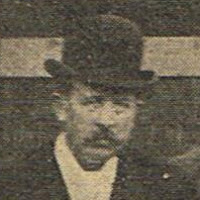Samuel Ormerod

Born: Accrington, 1848, died: 1906
1st August 1895 - 1st July 1902
Sam Ormerod was a noted player in the Accrington area of Lancashire during the 1870s and by the early 1880s he was known to be a referee, and it is believed he was one of the key men behind the creation Accrington FC in 1876. Accrington won the Lancashire Cup in 1881 and Ormerod appears on the team photograph with the eleven players who won the trophy, and seven years later Accrington were founder members of the Football League.
In November 1883 Ormerod refereed a game featuring Bolton Wanderers, and so appalled the home crowd that he was ‘hooted on the field”, according to the Lancashire FA, then he was followed from Bolton’s Pikes Lane ground by a crowd. He was then assaulted on his way to the train station. The Football Association carried out an investigation and suggested that Bolton be expelled from the Lancashire FA. The Lancastrians disagreed but clearly Ormerod had been badly treated.
When he was appointed City manager in 1895 Ormerod was expected to take the Blues on to a new level and with both Lawrence Furniss and Joshua Parlby on the club committee, it was difficult for him to have total control of team affairs. He still managed to achieve a great deal in his first season with City reaching the Test Matches (equivalent of the modern day Play Offs) after finishing second. Sadly, the Blues failed to gain promotion, but in the seasons that followed he continued to see City challenge. They finished 6th, 3rd, and then in 1899 as Division Two Champions. This was the first season of automatic promotion and City, along with local rivals Glossop, became the first side to gain automatic promotion. It was also the first national success achieved by either of the Manchester sides.
Sadly, life in the top division wasn't easy and during the 1901-2 season Ormerod received more than his fair share of criticism with the leading sports paper of the day – the Athletic News - attacking his team selection and organisational skills on a regular basis. In the 21st Century this criticism could be seen as a normal activity, however it seems this was an early attempt to alter the views of the supporters and to then force change within the Club. The Athletic News was owned by the high profile press baron Edward Hulton and around this time Hulton was developing an interest in City. His newspaper empire had a significant Manchester presence and City were clearly a very popular club. Influential committee man John Allison had encouraged Hulton’s involvement and the two men seemed keen to bring in a vastly more experienced football secretary-manager. They wanted a higher profile leader to help the Club become a major power.
Relegation in 1902 allowed those seeking to make City a major power to act. A stormy AGM in June revealed debts of almost £1,000, and there were significant changes at Board level. Ormerod resigned almost immediately. He later managed Stockport County and Clapton Orient, but passed away shortly after being dismissed from Orient in 1906.
Ormerod was a highly knowledgeable football man and had achieved a great deal throughout his footballing life. Achieving promotion in 1902 made him the first manager to find any form of national success at either Manchester side, although it has to be stressed that he was rarely given a free hand to pursue his own team selection and tactical plans at Hyde Road. Nevertheless, he helped to manage the transition from poor performing Second Division side to a team ready to match the elite.
All history and statistical material has been produced based on the research and writing of Manchester football historian Gary James (www.facebook.com/GaryJames4). It is maintained by Ric Turner & Gary James. All text remains the copyright of the original contributors.
Gary's book, Manchester - the City Years: Tracing the Story of Manchester City from the 1860s to the Modern Day, is available to order on Amazon.